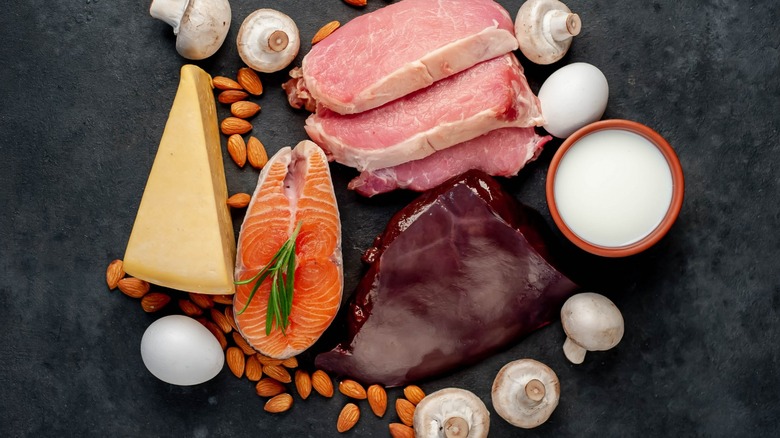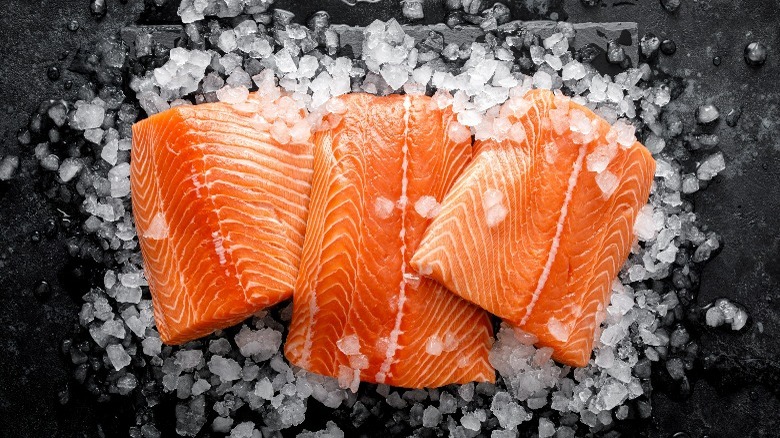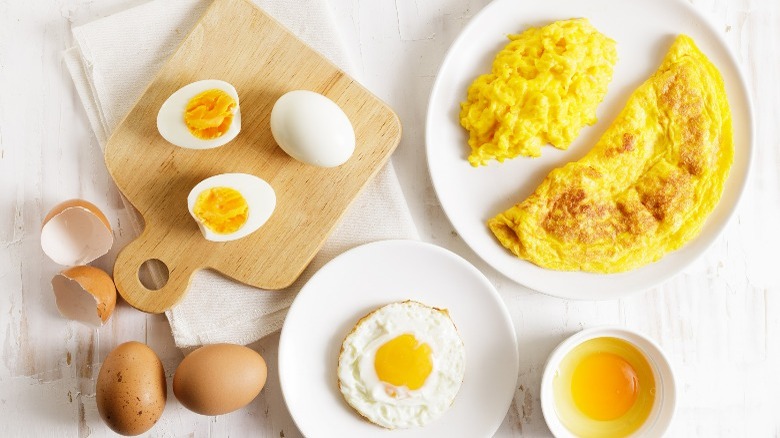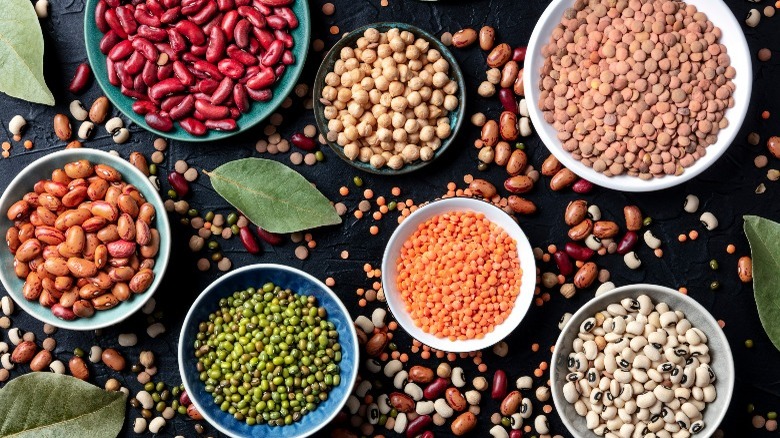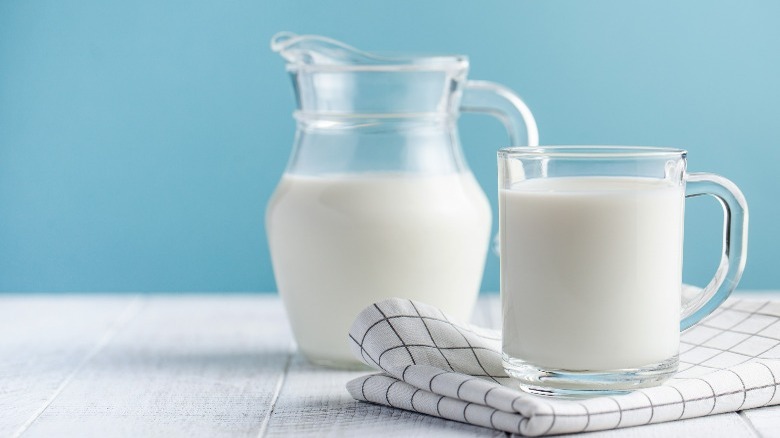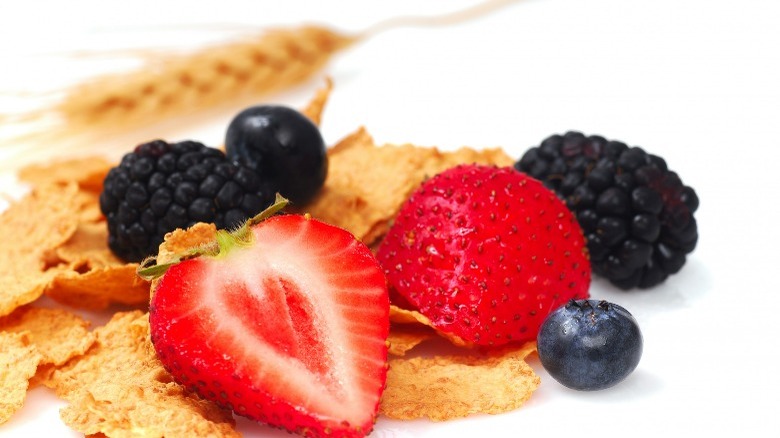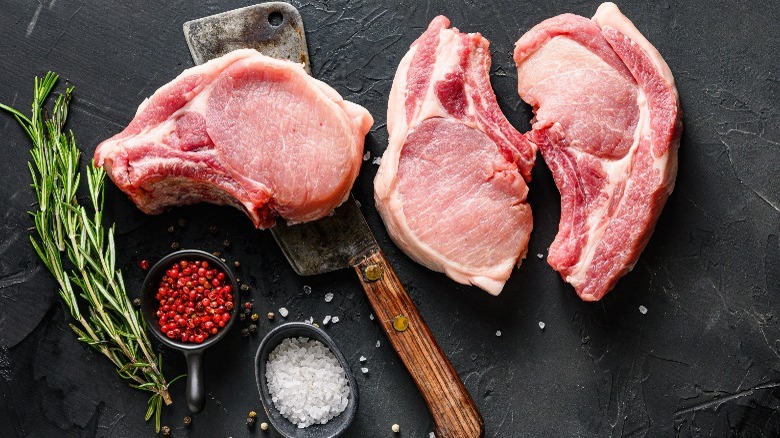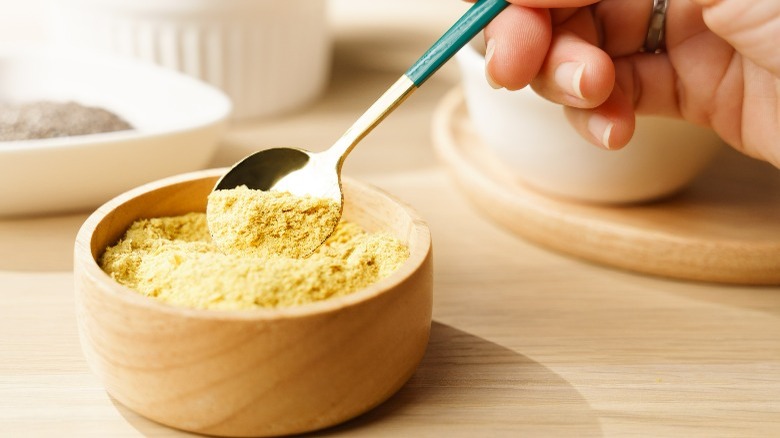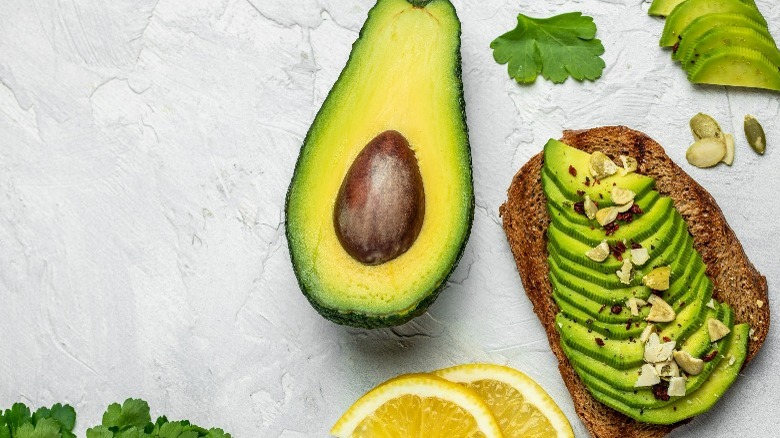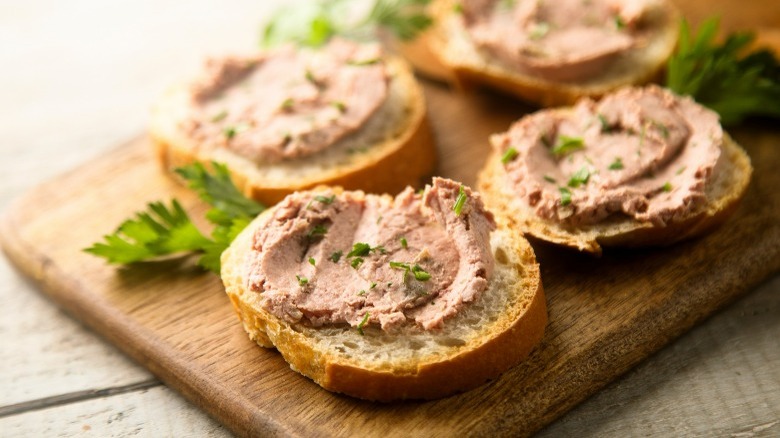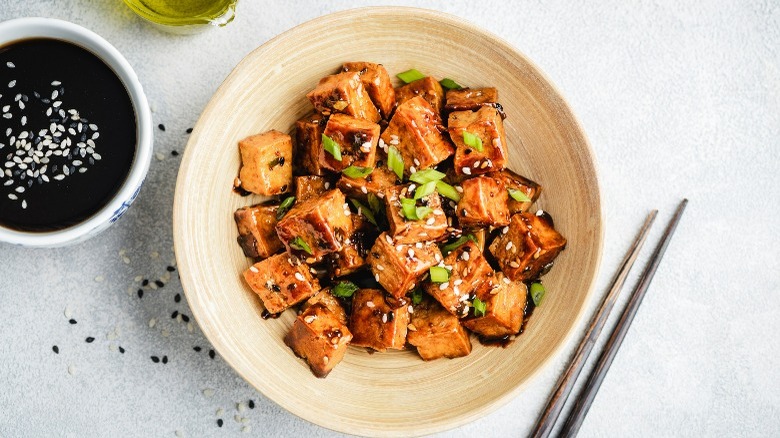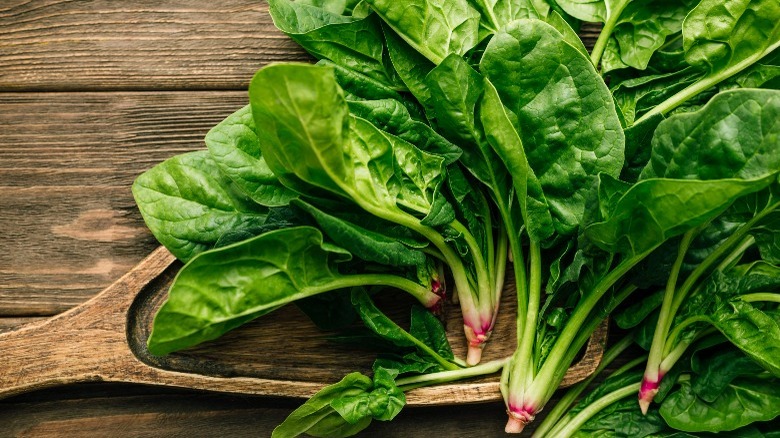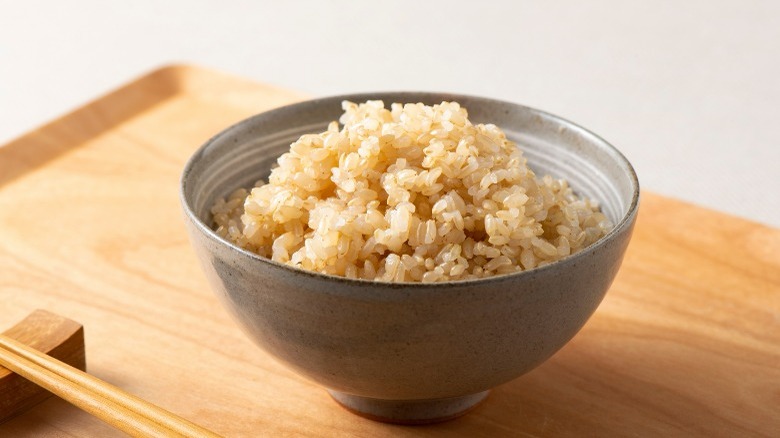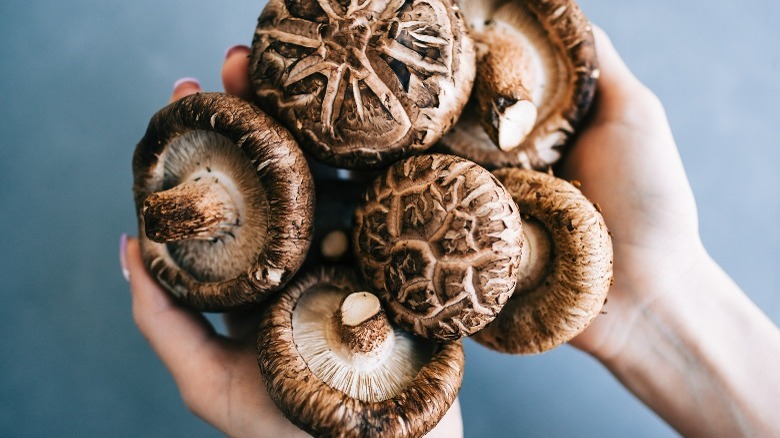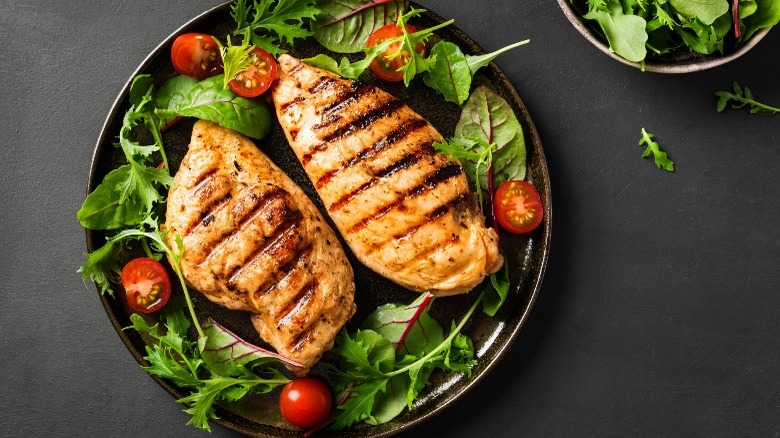Eat These Foods If You Need More Vitamin B
Feeling tired lately? Maybe it isn't stress or lack of sleep. If you find yourself chugging coffee to get through the day — or if you're feeling, well, kind of blah — your body might be telling you something. The easiest place to start looking for clues is your diet. And if there's one nutritional deficiency responsible for causing fatigue, it's vitamin B (via Healthline).
Vitamin B, however, does a lot more than give you a much-needed energy boost. It's a key player in carrying out vital bodily functions, such as forming red blood cells, regulating hormone production, and maintaining brain, immune, and digestive health (per Verywell Fit). In fact, this powerhouse micronutrient is not one but eight vitamins, often referred to as B complex: B1 (thiamine), B2 (riboflavin), B3 (niacin), B5 (pantothenic acid), B6 (pyridoxine), B7 (biotin), B9 (folate), and B12 (cobalamin), according to the Harvard T.H. Chan School of Public Health.
Because vitamin B is water-soluble, the body doesn't store it — so it's important to keep up with vitamin B in your regular diet (via Verywell Fit). The good news, however, is that there's a slew of vitamin B-rich foods to choose from. (Yes, even for vegans and vegetarians, who have an elevated risk of vitamin B deficiency). If you have any concerning symptoms, it's best to consult your doctor. But if you find that a simple diet tweak is all you need, read on to find the top food sources of vitamin B.
Salmon
Look at any list touting the top brain health superfoods and you're bound to find salmon. One reason is its high concentration of B vitamins, specifically B12, which plays a key role in preventing cognitive decline by metabolizing excess homocysteine, an amino acid, in the blood (per a 1999 article in Annual Review of Nutrition). A 2016 review in Nutrients found that high homocysteine levels were linked with a higher incidence of Alzheimer's disease, dementia, and other cognitive diseases. Additionally, B12 assists in the synthesis of DNA, formation of red blood cells, and healthy nerve function, according to a 2012 article published in Advances in Nutrition.
An important note on B12: It can only be found, in its natural form, in meats. But before you rush out for the nearest Double Whopper, you should know that salmon has more B12 — 208% of the daily value (DV)— than beef, according to Livestrong. This peachy-hued fish is also loaded with omega-3 fatty acids (aka good fats that your body needs to properly function). "Even though salmon is reasonably high in fat, I would still consider it a lean protein because it's low in saturated fat," Karen Conger, a registered dietician, told Livestrong. So, if you're looking for a low-calorie, high-protein option to get your vitamin B12, add a couple of salmon filets to your weekly grocery list.
Eggs
Scrambled, poached, fried — no matter how you take your eggs, they provide an impressive array of health benefits. But remember: The yolk is where all the good stuff is. And that includes B vitamins, especially B7 (via Healthline).
Let's refer to vitamin B7 by its more commonly known name — biotin (via Harvard T.H. Chan School of Public Health). Biotin does a whole host of things in the body, including supporting the immune system (per Medical News Today) and playing a key role in DNA regulation and neurotransmitter function (per National Institutes of Health). WebMD also notes that biotin aids digestion and helps metabolize folic acid for red blood cell formation.
Because most healthy adults get enough biotin from the foods they eat, there isn't a recommended daily allowance, but the adequate intake recommendation is 30 micrograms for males and females, and 35 for those breastfeeding (per Harvard T.H. Chan School of Public Health). Eggs contain 10 micrograms, 33% of the daily value (via Healthline). You can therefore meet your daily needs by eating two to three eggs for breakfast every day. The takeaway: Don't toss those egg yolks!
Legumes
Legumes aren't just a delicious, protein-rich alternative to meat (via The Washington Post), they're an excellent source of an important vitamin: B9 (folate). While this mighty nutrient may not get as much attention as its vitamin cousin B12, it serves many essential bodily functions, such as cell growth and regeneration, red blood cell formation, and DNA production (per MedlinePlus). Additionally, with the help of vitamin B12 and vitamin C, it helps break down, use, and create proteins.
According to a 2018 review in the Biomedical Journal of Scientific & Technical Research, millions of people around the world are deficient in folate. This is especially concerning for pregnant women, considering that, as the review states, "inadequate intake of folic acid [the synthetic form of folate] during pregnancy increases the risks of preterm delivery, low birth weight, fetal growth retardation, and developmental neural tube defects (NTDs)." Folate deficiencies are also associated with "neurodegenerative disorders, cardiovascular diseases, and a range of cancers."
The National Institutes of Health report that the recommended daily allowance for folate is 400 micrograms for adult males and females. That intake should increase to 600 micrograms during pregnancy and to 500 micrograms while breastfeeding. Though legumes offer an abundance of nutritional benefits, not all contain adequate amounts of folate. Lentils are one of the best legumes to up your intake of folate, with a cup serving providing 90% of the daily value, per Healthline.
Milk
With non-dairy milk options popping up everywhere, it seems like good old-fashioned cow's milk has gotten a bad rap, namely for being unnecessary after childhood. Sure, there are other ways of getting some of the nutrients found in milk, but it's still a viable option if you're not vegan and don't have a lactose sensitivity or intolerance.
What's more, milk, as well as other dairy products like yogurt and cottage cheese, contains a healthy dose of vitamin B12 — 46% of the daily value, according to the U.S. Department of Agriculture (USDA). Vitamin B12 is critical to optimal cell, nerve, and vascular function. A deficiency, which often occurs in people who eschew animal products or those with digestive conditions, could lead to "anemia, fatigue, muscle weakness, intestinal problems, nerve damage and mood disturbances" (per Mayo Clinic).
Here's another factor that works in milk's favor: Intestinal absorption of vitamin B12 is more efficient from milk than from animal meats and supplements, according to a 2014 study in Animal Frontiers. Even better: Whole (i.e., full-fat) milk is superior to skim milk when it comes to nutrient absorption. "Most vitamins in milk are fat-soluble, which means they need fat to be absorbed and utilized by the body," Deborah Malkoff-Cohen, a registered dietician, told Women's Health. "In skim milk, since all the fat is removed, there's no vehicle for all of those vitamins to be used." Maybe there was something to those Got Milk? ads, after all.
Fortified Cereal
No, sadly, this isn't the sugary go-to breakfast of your childhood days. It is, however, the nutrient-dense food your body craves. Fortified cereals are packed with minerals and vitamins — including your A, B, and C vitamins — and can help you meet your daily nutrient needs, per Healthline.
What does fortified mean, exactly? Fortified foods have been enriched with vitamins and minerals to boost nutritional value. B vitamins are one of the most common ingredients boasted on cereal boxes — a boon to vegetarians, vegans, and those who relish a carb-laden breakfast. A 2004 randomized trial in The American Journal of Clinical Nutrition found that participants who ate 1 cup of fortified cereal daily saw a significant increase in vitamins B6, B9, and B12, as well as a decrease in homocysteine concentrations. The study states that "high homocysteine and low B vitamin concentrations have been linked to the risk of vascular disease, stroke, and dementia and are relatively common in older adults."
Delicious as some cereals can be, they can also contain high amounts of refined sugar, negating other nutritional benefits (via Healthline). Instead, look for fortified cereals with whole grains, suggests Livestrong, since these provide good sources of fiber.
Pork
While pork is often called "the other white meat," it technically belongs to the red meat family (via Healthline). Nonetheless, pork, depending on which cut of meat you get, is generally high in protein. It's also rich in vitamins B3, B6, B12, and especially B1 — otherwise known as thiamine (via Healthline).
Thiamine is largely responsible for giving vitamin B its reputation as a natural energy booster, given that its primary function is to turn food into energy (per the Mayo Clinic). It thus serves a critical role in metabolism and in the growth, development, and function of cells. Thiamine deficiency can lead to peripheral nerve damage and metabolic disorders (via National Institutes of Health). Fortunately, because thiamine is found in a variety of foods — from meats to grains to legumes — most adults meet their daily requirement. The recommended daily allowance for thiamine is 1.2 milligrams for males and 1.1 milligrams for females. A 3-ounce serving of broiled pork, with the bone, comes to 33% of the daily value.
Because cooking depletes the vitamins and minerals in meat like pork, Healthline suggests slow cooking, pressure cooking, and sous vide as the healthiest ways to cook meats without losing vital nutrients.
Nutritional Yeast
If you're feeling like Parmesan is a little outdated, here's a trendier option: nutritional yeast. These golden flakes are all the rage among vegetarians and vegans, their cheesy, nutty flavor adding a special zing to any non-meat dish (via Healthline). Nutritional yeast's versatility as a food additive aside, it scores major points in the superfoods category. It contains all nine essential amino acids, making it a complete protein, and it boasts several key trace minerals — zinc, selenium, manganese among them — involved with metabolism, cell growth, and immunity.
Nutritional yeast — specifically the fortified kind — also has a stellar vitamin B profile: Just two teaspoons contain 246% of the daily value (DV) for B2, 109% of the DV for B3, 212% of the DV for B6, and 313% of the DV for B12. "If vitamin B12 is added, it is a good source of B12," Sonya Angelone, a registered dietician and spokeswoman for the Academy of Nutrition and Dietetics, told Women's Health. "Even when not fortified, though, it is a significant source of other B vitamins and some trace minerals." Who said vegetarians and vegans couldn't get their B vitamins?
Avocados
On toast, in a smoothie, or even blended into your margaritas, avocados are a must-have grocery item, so delicious as to seem decadent (via Shape). This one-of-a-kind fruit is a reigning favorite among dieticians and nutritionists alike — and for good reason. Its omega-9 fatty acids help lower cholesterol and prevent heart disease. Its insoluble fiber aids digestion and controls blood sugar. And its high content of vitamins and antioxidants keep the body looking — and feeling — younger. "Many people think of avocados only for their healthy fat content, but they boast a ton of other nutritious benefits," Jenna A. Werner, a registered dietician, said to Shape.
One of these nutritious benefits includes an impressive vitamin B lineup. Half an avocado (or about 100 grams) contains 15% of the daily value for B6 and 28% for B5 (per Medical News Today). But that's not all. Avocados are also a good source of B1 (thiamine), B2 (riboflavin), B7 (biotin), and B9 (folate). According to a 2017 study in Congenital Anomalies, not only can B9 help prevent birth defects and certain types of cancer, it can also keep depression at bay by stabilizing the neurotransmitters serotonin and dopamine, both of which affect mood. Translation: The avocado craze is well founded and doesn't look to be dying down anytime soon.
Liver
It may not be the most appetizing item on this list, but you'd be hard-pressed to find a more nutrient-dense meat than liver. It's one of the richest sources of B vitamins on the planet, especially B12, containing 3,460% of the daily value (per Healthline). Yes, you read that right! But even with nutritious foods, there can be too much of a good thing. According to WebMD, physicians typically recommend no more than one serving (about 4 ounces) of liver per week to avoid vitamin toxicity, unless someone is vitamin deficient.
Liver is also high in B2, or riboflavin, supplying 260% of the daily value (per Healthline). Like other B vitamins, B2 serves several important functions throughout the body. Not only does it help with metabolizing fats, carbs, and proteins, but according to Riboflavin Deficiency, B2 "functions as an antioxidant for the proper functioning of the immune system, healthy skin, and hair." Meeting the daily needs of B2 can also decrease migraines and help with eye disorders such as cataracts, glaucoma, and keratoconus. B2 deficiency, though uncommon, can cause anemia, migraines, peripheral neuropathy, night blindness, and a host of other conditions.
Now, the real question: How on earth do you make liver taste good? Livestrong recommends braising, pan broiling, or frying it. You can also top it with celery, onions, and carrots, or make it into a pâté and spread over toast or crackers.
Tofu
Though tofu has been a staple in Asian cuisine for centuries, reports SFGATE, it's been a game changer for vegans and vegetarians across the world. So versatile is tofu (also known by its less desirable name, bean curd) that it even comes in a variety of textures: extra soft, soft, firm, extra firm (via Britannica). But two features make this food a health standout: It's a complete source of protein, meaning it contains all nine essential amino acids (via WebMD), and it's packed with trace minerals and vitamins, including B2, B6, and B12 (per My Food Data).
Now that you know the benefits of B2 and B12, let's discuss B6, otherwise called pyridoxine. According to Harvard T.H. Chan School of Public Health, pyridoxal phosphate, the active form of B6, "is a coenzyme that assists more than 100 enzymes to perform various functions, including the breakdown of proteins, carbohydrates, and fats; maintaining normal levels of homocysteine (since high levels can cause heart problems); and supporting immune function and brain health." The recommended daily allowance of B6 for adults 50 and younger is 1.3 milligrams; after 50, it is 1.5 milligrams for women and 1.7 milligrams for men, according to the Mayo Clinic. One cup of fortified tofu has 1.1 milligrams (per My Food Data), meeting anywhere from 65% to 85% of the daily value, depending on your needs.
Spinach
The good news about getting your daily dose of B vitamins is that it introduces you to a plethora of healthy foods, spinach being one of them. Toss a few leaves in a smoothie to make a breakfast of champions; mix it in with your salad for a nutrient-dense lunch; or sauté it as a sweet yet savory side dish for dinner. "It's one of the top green leafy vegetables," nutritionist Angelique Panagos told Women's Health. "Spinach is packed with vitamins, minerals and phytonutrients. It supports our natural detoxification processes and benefits our overall health." The all-star B vitamin in spinach is B9 (folate), with one cup containing 66% of the daily value (per My Food Data). Given how low-calorie spinach is, it's remarkably high in protein and fiber (per Healthline). A bonus: Spinach is 91% water, so along with delivering a potent punch of vitamins and minerals, it will help hydrate you.
Still not convinced? As Health notes, spinach nourishes nearly every system in the body, including the circulatory (thanks to its high water and iron content), musculoskeletal (vitamin K and calcium were what made Popeye's muscles pop), and visual (due to a powerful antioxidant called lutein). A 2009 study in The Journal of Clinical Psychiatry also found that folate eased symptoms of major depressive disorder in some individuals. Altogether, spinach is a powerhouse leafy green you won't want to go without.
Brown Rice
When it comes to the healthful benefits of brown rice versus white rice, the former trumps its refined counterpart any day. Brown rice is considered a "whole" grain because, unlike white rice, it retains its outer covering (the bran and germ) after the milling process (per Healthline). This vaunted grain also comes replete with vitamins, minerals, and antioxidants. Its B vitamin content includes six of the eight B vitamins: B1, B2, B3, B5, B6, and B9 (per Healthline). Because it is also a rich source of fiber, brown rice keeps you feeling full longer, thus helping with weight management and weight loss (via Health). More importantly, it keeps your body healthy by stabilizing blood sugar levels and decreasing heart-risk factors such as high blood pressure and high cholesterol, according to a 2007 study in Journal for the Integrated Study of Dietary Habits.
Another great feature of brown rice is that it's gluten free (via Health). If you've ever eaten a piece of gluten-free toast that tasted like — and had the consistency of — cardboard, you know that there are plenty of poor wheat-substitute options on the market. Brown rice, on the other hand, is delicious: nutty in flavor and chewy in texture. You can add it to any dish or eat it on its own. No matter how you serve up this wholesome grain, your body will thank you.
Shiitake Mushrooms
One of the most well-known foods of the fungi world, shiitake mushrooms don't just have a cool name, they're also a great source of B vitamins, with B5 (aka pantothenic acid) leading the pack. Four whole shiitake mushrooms contain 33% of the daily value for B5 (per Healthline). The active form of B5, called coenzyme A, plays a key role in fatty acid synthesis, according to the National Institutes of Health.
Shiitake mushrooms also deliver other vital nutrients such as vitamin D, zinc, and choline — all of which can be difficult to obtain from plant-based diets (per Verywell Fit). Among shiitake mushrooms' many health benefits are reducing blood pressure, helping to prevent gingivitis and prostate cancer, and strengthening immunity. In fact, mushrooms have long been recognized by scientists and holistic health practitioners for their immunomodulating effects and ability to fight inflammation (via Trends in Biotechnology). So, to keep your immune system in check and meet your daily vitamin B needs, sprinkle a handful of these earthy-flavored gems into your stir-fry or salad.
Chicken
What hasn't been said about chicken? It's a popular food used in many different types of cuisine. It's also as nutritious as it is versatile, packed with high-quality protein and rich in vitamins. Included in chicken's B vitamin profile are B3, B5, and B6 (per Livestrong). Of these, it contains the highest recommended daily amount of B3, also called niacin. A 6-ounce serving of skinless chicken breast provides 16.1 milligrams of niacin, which meets 100% of the daily value (via My Food Data).
Niacin plays several key roles in how well your body functions. According to Harvard T.H. Chan School of Public Health, niacin helps to build and repair DNA, release antioxidants in the body, and convert food into energy by metabolizing fats and carbs. Additionally, it protects skin cells from sun damage and brain cells from "stress and injury." A niacin deficiency can cause brain fog, drowsiness, canker sores, poor circulation and digestion, and depression (per WebMD).
